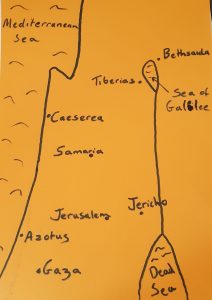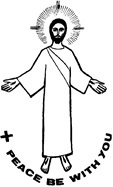Acts 8:26-40, John 15:1-8
Video link for this reflection: https://youtu.be/54Lb07PdgkA
In the name of the Living God: Loving Father, Risen Son and ever present Holy Spirit, Amen
Let’s concentrate on our first reading from Acts – Who was Philip? There are in fact several Philips mentioned in the New Testament, including one of Jesus’ original 12 disciples, but the Philip who stars in our story this morning was one of the early converts in Jerusalem in the first days after Pentecost. It is thought he was originally a Jew who had lived outside of Palestine, but had probably come to Jerusalem to attend one of the religious festivals and stayed on after his conversion to Christ. Therefore, Philip was an “ordinary” person like us. He had not known Jesus in his lifetime. His belief launched him on a course of action that gave special significance to his life.
Philip’s story is an interesting one. Philip soon became one of seven men who had so gained the trust of the Christian community that they were appointed to oversee the distribution of food to Christian widows and orphans. Then when most Christians were forced out of Jerusalem by persecution (all around the time when Stephen – another of the recently appointed overseers was stoned) – The followers of Jesus were widely dispersed and Philip ended up around 40 miles from Jerusalem in the city of Samaria and he told the people there about Christ.
 Here is a rather approximate map showing Samaria and Jerusalem So we can understand the distance involved. In Samaria, Philip rapidly inspired people through his teaching and more people became members of the early church. Earlier in Acts 8 it says that the crowds with one accord listened to Philip. He must have been very impressive and a good speaker – for people to be so rapt in attention to him. He did not just speak as he was also doing signs and wonders, and through the power of the Spirit dwelling within him many people were healed of many different conditions. In fact, so much was happening in Samaria that the disciples Peter and John also went to see what was going on and to be part of it. They also helped the people fully receive the power of the Holy Spirit.
Here is a rather approximate map showing Samaria and Jerusalem So we can understand the distance involved. In Samaria, Philip rapidly inspired people through his teaching and more people became members of the early church. Earlier in Acts 8 it says that the crowds with one accord listened to Philip. He must have been very impressive and a good speaker – for people to be so rapt in attention to him. He did not just speak as he was also doing signs and wonders, and through the power of the Spirit dwelling within him many people were healed of many different conditions. In fact, so much was happening in Samaria that the disciples Peter and John also went to see what was going on and to be part of it. They also helped the people fully receive the power of the Holy Spirit.
It is into all of that situation, Philip, with the crowds hanging on his every word and lots of signs, wonders and excitement, that we find the angel of the Lord sending him in another direction completely. This is where our reading today starts. In Acts, we don’t get Philip’s reaction and we can wonder about what he felt about it. When we are already in the midst of something that is exciting and rewarding, it might have been tempting to ignore the angel and stay put! Certainly what he was doing and how he was doing it in Samaria was yielding significant fruit for Christ. Sometimes relative success can make turning in a different direction more difficult to take on board. Yet we have no sense of hesitation in Philip. It says plainly He got up and went. Maybe ignoring an angel of the Lord is just not what you do! For certainly, when I have had strong senses that this is something I have to do from God, this has usually been very much the case. When I have ignored such feelings I have always regretted it!
Even with our 21st century understanding, where the angel was pointing Philip too doesn’t sound terribly attractive. Go towards the south to the road that goes down from Jerusalem to Gaza. (This is a wilderness road.) We know this is a disputed area between Israel and Palestine even today. Philip displayed an amazing level of obedience really, just to go as he did. He was not just willing to be both useful where he was now but also to go to an unfamiliar place where he didn’t know what would happen next. A place where it was less than obvious how his talent for inspiring people about Christ was going to be used or where there was going to be lots of people to hear.
-
Ah yes – we really need inspiring speakers who can draw a crowd in the wilderness!
-
Ah yes – we really need a gifted healer in the wilderness where nobody lives!
Both of these are clearly a nonsense! What’s more if we just return to the map, we do need to consider the distance Philip was being asked to go too. Samaria is here and Gaza is here – even as the crow flies we are looking at more than 80 miles! Certainly further than that as the tracks go! This was hardly an everyday thing to do. Philip’s confidence in what he was doing is even more admirable in view of the distances involved and his courage!
It is easy to feel daunted and intimidated by our current times and circumstances. With the power of the Holy Spirit we only need to concentrate on each step of the way, rather than have it all mapped out ahead of us. We need to pray for the Spirit to help us be courageous as Philip was. Even when we don’t know what exactly is going to happen next!! Just as an aside I do have a mix of feelings about how to proceed from this point forward. Safety and safely have been our primary concerns in all our journeys up to this point. For our churches, we will be exploring with the PCCs and our working groups how to move forward positively and where the Holy Spirit is leading us – exciting and challenging times ahead. We will need to concentrate on just knowing the next step like Philip did (not the 15 or so after that). For someone like me who loves a good plan – this is hugely frustrating, but I think the only way to do this in line with what God wants of us and to do it courageously too.
Yet to Philip following where the Holy Spirit was leading was the only course of action he considered. He was living within himself following the path the Holy Spirit had for him and as a direct result of his faithfulness and obedience, confidence and courage unpromising as it may seem, he ended up in a place where God could use him to great effect. We need to remember this too in the days ahead! Philip was ideal to help the Ethiopian Eunuch understand about the good news of Jesus Christ. How true it is even today, that God used the open door of Philip’s heart as an opportunity in his life, as God can use the open door of our hearts as opportunities in our lives, in the most unlikely of places, if we are open to his plan for our lives. How can we become more willing to listen and to follow the guidance of the Holy Spirit, and to follow the guidance of the Holy Spirit however unlikely that guidance may seem, however far the journey takes us?
Later traditions identify the man that Philip helped as the founder of the Christian Church in Ethiopia. So Philip’s obedience and courage had immense consequences for good. With hindsight, knowing the end of the story – we can see all this makes sense but that is hardly how it must have felt lived at the time . As we know too well – we do not live with the benefit of hindsight. All our lives have been engulfed by something that has shaken our foundations! And many things we took for granted! For us as it was for Philip the challenge is what we do in the middle of our daily life, where there is no hindsight to affirm what we feel we should do to follow God. Especially when we feel we are being asked to do something unusual and demanding or something we would rather not in all honesty be doing! And of course, where we need to be courageous! This is the challenge of discipleship and following the spirit’s guidance in our lives.
As the Gospel reading reminded us, we are to abide in God’s love for us and let his words abide in us. Abiding in Christ is the way to ensure that we are sensitive to the Holy Spirit and living not at the mercy of our own whims. The picture of the vine in that reading is also one of growing, pruning and fruitfulness:-
-
Dwelling in God is the way for us to grow to be fruitful.
-
Dwelling in God is the way where as necessary we are pruned.
-
Dwelling in God is the way to give us the strength to follow where God leads us no matter how unlikely what God has in mind may seem.
I am ending these thoughts with a prayer for courage: – Holy Spirit, give us courage to move willingly into the unknown. Holy Spirit, give us courage to be willing to proceed with joy. Holy Spirit, give us courage so that our uncertainties do not turn into terror. Holy Spirit, give us courage to overcome the lures that may compromise our faith. Holy Spirit, give us courage to remain steady until we hear your voice, that in all we do and say, your name will forever be praised. Amen
CCLI – Song reproduced and streaming license under CCLI 217043 for St Peter and St Paul Church, Wincanton
New Revised Standard Version Bible: Anglicised Edition, copyright © 1989, 1995
Copyright acknowledgement Some material included in this service is copyright: © The Archbishops’ Council 2000-2020
The prayer is adapted from www.rootsontheweb.com and is copyright © ROOTS for Churches Ltd. Reproduced with permission.


